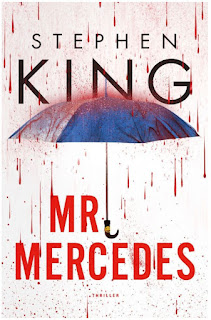Mr Mercedes
Strange to say that this is the first Stephen King book I have read, though I come to the table knowing about his brilliance as a plotter, and his authority as a writer, especially in terms of his open advice to would-be authors. This reputation also makes me nervous to be critical; there does appear to be a different set of rules for King and writers of his ilk. So, this will be a neutral review and confined to some simple observations.
With regards to plot and structure, the novel concerns a
mass-murderer/white terrorist; one without religious impulse (unless you count
quoting from Nietzsche – when you gaze
into the abyss, the abyss also gazes into you). On this point, King makes
the reader aware of the mass murderer’s reflections on 9/11 on two occasions;
the first is the annoyance of someone who is aware of extra security and
back-pack checks which restrict his own use of plastic explosives (“they
spoiled it for the rest of us” p.252). The second time he ‘muses’ on the
terrorists who brought down the World Trade Centre it is to reflect on their
religious impulse, and to contrast their hopes of heaven with his own
realisation of eternal nothingness: “the truth is darkness, and the only thing
that matters is making a statement before one enters it. Cutting the skin of
the world and leaving a scar. That’s all history is, after all: scar tissue”
(p.301). So, King gives us a post-9/11 terrorist, not one that we fear, though
we should, but a local white boy with
delusions of grandeur and a hatred of self and the world. The man is a nihilist of the sort older generations feared (his purposeful lack of belief), armed with the grandstanding that might come after those great symbols of capitalism fell from the sky and left us all in their perpetual dust-clouds for years to come ...
King alternates perspective simply and effectively between
this young killer, a certain Brady Hartsfield (and ‘heartless’ is Brady) and a recently
retired police detective, Bill Hodges. Hodges has the reader’s sympathy, though
his quick affair with a beautiful woman, Janey, twenty years his junior,
stretches believability and not only for Bill, but the reader. That’s as close
as I am going to get to a critical comment. I will say, however, that in terms
of "author's style", I found that the book almost lacked it altogether. This may be King’s
thing, but the author appears to be quite absent,
in a manner that we do not find in more literary fiction. This book might have
the hallmarks of a King novel to those that know his way of writing, but to me
it might have been written by a younger writer with good technical skills.
In
saying this, I recognise the craft of the writing of a thriller, with actually
a good deal of sympathy for not only Bill but the cast of characters that fill
the pages. And it’s also true that there is nothing superfluous here (the other
side of a book which has eliminated traces of author stylistics). The Guardian review included the
quotation ‘I challenge you not to read this book in one breathless sitting’. I
must be a slow reader, because it took me a few weeks. But I was engaged and enjoyed
the book, a sort of hybrid police-thriller, with a nod to the private-eyes of
the past (including the fatal use of a fedora), one-sitting or not. It's clever stuff, because it is intelligent writing without any hint of pretension. And when I close the book, I think: he's still "the King", and "the no.1 bestseller", someone who knows a thing or two about writing, whether I adored the book or not.




Comments
Post a Comment